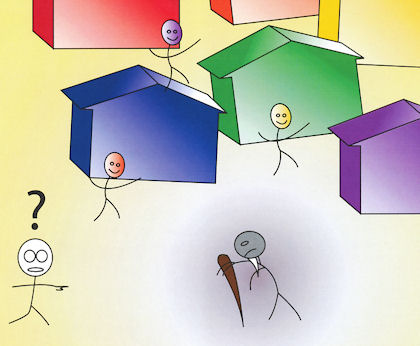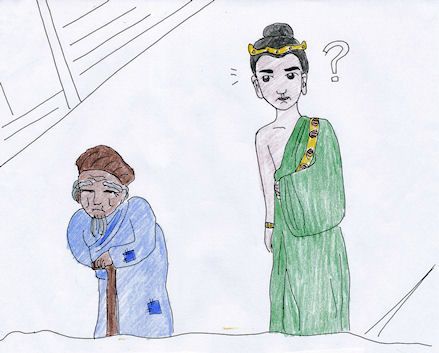
But suddenly there appeared a bent-over, emaciated, toothless, white-haired old beggar.
Drawing by an Anonymous Student, Sixth College (UCSD), Class of 2009, by permission
But Prince Xīdá-duō was not happy in the paradise his father created for him, and the very fact that he was not allowed to know what was outside the wall made him especially curious about it. He begged and begged to be allowed to see what life in the outside world was like.
Finally his kindly father consented to his making a tour of the outside.

Before the trip, and out of hearing of the prince, King Jìngfàn declared that the route his son would take heading out from the east gate of the palace should be fully prepared, with all the houses cleaned and repaired and painted. Everyone along the road should appear healthy and happy. All work should be prohibited in sight of the road. And above all, the poor, the old, the blind, the sick, the leprous, and other such people in sad circumstances should be all be locked in their houses and not permitted outside until after the prince's chariot had long passed. And no funerals should be conducted along the way.
When the prince went out, everyone he passed was smiling, and they threw flowers in his path and shouted "Long live prince Xīdá-duō!"
But suddenly —nobody quite understood just how— there appeared a bent-over, emaciated, toothless, white-haired old beggar in tattered clothes, who walked with a stick and who had somehow missed the instructions. The crowd was indignant and rushed to conceal him. But Xīdá-duō had already spotted him.
The prince was fascinated, and asked his chariot driver Chēnì 车匿 for details. "Is this a man? Why is his hair white? Why is he bent over? What became of his teeth?"

Chēnì knew that the man's condition was simply old age, and he knew that he should not speak of this in the presence of the prince.
However, Chēnì was also a simple and honest soul, and he felt great affection for the prince and loyalty towards him. So he answered:
"This is an old person," explained Chēnì. "He was not born that way. He once had black hair and a straight body; his eyes shown and his teeth were perfect. But when a person has lived a long time, these things change."
"And does this happen to everyone who has lived a long time?" asked the prince.
"Indeed," said Chēnì. "No one can avoid getting old."
"No one, Chēnì?!"
"No one, my lord."
The prince was thunderstruck. He immediately ordered the chariot to return home, so he could be alone with his thoughts. He thought of all his family and his dearest friends, and the refrain continued to ring through his head: "No one can avoid getting old." Not the rich. Not the poor. Not the strong or the weak. Not the beautiful or the ugly. Not the wise or the dim. Above all, not his own family and friends. Not even himself. No one.
When King Jìngfàn learned of the day's events, he was angry, of course. But even more than that he was heartbroken, for, step by step, he was seeing the dreaded prediction coming true before his very eyes and in spite of his best efforts. He ordered every possible distraction to be brought to the prince, but the prince was even less interested than before. Xīdá-duō had become utterly fascinated by old age.